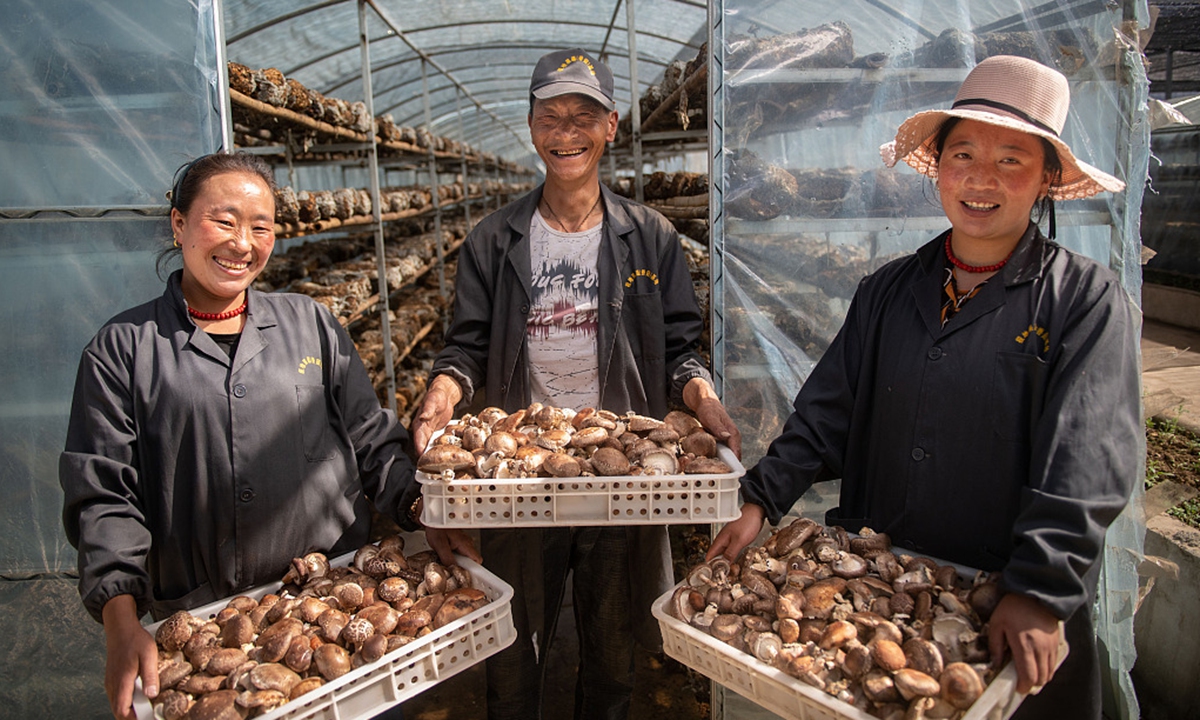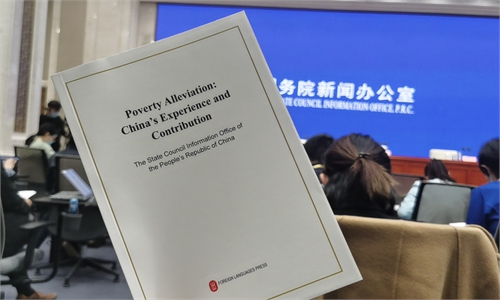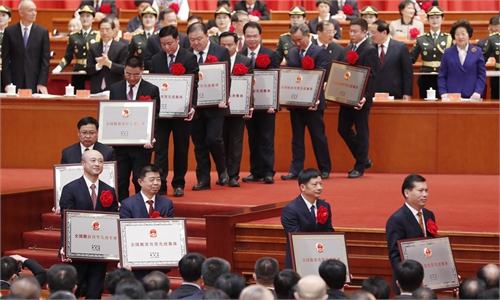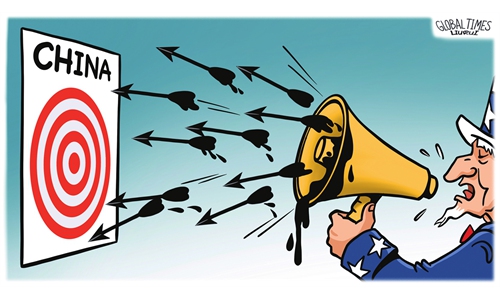
Poverty alleviation Photo:VCG
Editor's Note:
During the 19th G20 Summit in Rio de Janeiro, Brazil, Chinese President Xi Jinping delivered important remarks entitled "Building a Just World of Common Development" when participating in the discussions on the "fight against hunger and poverty" at the first session of the summit. He noted that what China's battle against poverty says to the world is that "if China can make it, other developing countries can make it too." In 2021, President Xi solemnly declared "complete victory" in eradicating absolute poverty in China. What does China's successful story of lifting 800 million people out of poverty tell the global community? Can China's experience in poverty reduction provide some lessons for other countries? The Global Times invited four internationally renowned experts to decipher the secrets behind China's poverty alleviation endeavors and their global significance.
Robert Lawrence Kuhn, chairman of The Kuhn Foundation and recipient of the China Reform Friendship Medal in 2018
What can the world learn from China's success in poverty alleviation? Many things, to be sure. Certainly, China hopes to share its poverty reduction experience - all aspects of it - with the world community, especially the poorest nations.
But first, a caveat. Each country is different. Each culture has its own history; the natures of different peoples are indeed different. We cannot take programs from one country and impose them wholly, without adaptation, on another country.
However, the principles are what's important. And China's principles of poverty alleviation are clear: "Targeted" poverty alleviation employs specific measures to fit specific circumstances and needs, and a clear organizational structure to implement those measures, monitor them, and check them.
What all countries should recognize in the fight against poverty is the critical importance of motivating officials to make poverty alleviation a priority in the hierarchy of values in their work. This can come only from the top down. This is a big lesson that China offers to the world.
Jorge Heine, former Chilean ambassador to China and a research professor at the Pardee School of Global Studies at Boston University
Humanity has made enormous progress in reducing poverty and extreme poverty in the past 40 years. China's role in poverty reduction is especially noteworthy, and the United Nations Millennium Development Goals were achieved in large part because China lifted some 800 million people out of poverty since it kicked off reform and opening-up.
The point is that, far from relying solely on economic growth by itself to reduce poverty, public policies targeted the counties mostly affected by it. This meant investing in infrastructure like water supply, roads, and networks, as well as equipping educational, health and cultural facilities, above and beyond normal budgetary allocations.
In China, poverty has been closely associated with rural areas and with remote locations. Integrating its vast, 9.6 million square kilometers territory via adequate transport and communications has been China's challenge since times immemorial. By doing this through its 160,000 kilometers of railway lines (46,000 kilometers of high-speed) and mobile telecommunications technology wielded by more than 1 billion people using mobile phones to access the internet, China has created many more economic opportunities for previously isolated communities.
A key point to keep in mind here is the issue of physical and digital connectivity. As the world moves toward a service economy, being connected is of the essence. And this is where China's Belt and Road Initiative comes in. Although it started as a project to recreate Eurasia, it soon evolved into something much more ambitious. What China is saying to countries in Africa, Asia and Latin America is: railways, mobile telephones and broadband access worked for us. Perhaps they will work for you as well.
John Ross, a senior fellow at Chongyang Institute for Financial Studies at Renmin University of China and former director of Economic and Business Policy for the Mayor of London
This is the biggest achievement in poverty reduction in the whole of human history. There have been so many people and such a large proportion of humanity being lifted out of poverty in such a short period of time. It was done by the CPC and the government of China. It was done by enormous, hard work, and by having a correct social and economic system. It shows that socialism is something which delivers for people.
I wouldn't call it a miracle. I would say that it shows the correctness of the policies which have been pursued. I think it's just very inspiring. It's the biggest contribution to human rights made by any country in the world.
In comparison with some Western countries, China has its advantages in dealing with poverty. Again, it comes down to the great advantages of the political system in China. But that has a real meaning. It was the socialist system in China which is able to make its economy grow so fast. To lift hundreds of millions of people out of poverty can only be done with the growth of the whole economy.
There are still many regions and countries suffering from poverty. There are many things they can learn from China. The most important thing is China sets poverty alleviation as the top goal. They put it as priority.
China accounts more than 70 percent of the reduction of poverty in the world. The situation in the world on poverty would be remote without what China has done. So China's contribution to poverty elimination and therefore to the real improvement to human rights is absolutely overwhelming.
China has done poverty reduction by enabling people to produce. What China has done is more sustainable because it's been done by creating infrastructure. It's been mainly done by greatly improving their actual conditions of life, their housing and their ability to make a living. That means it's much more sustainable.
Ei Sun OH, a senior fellow at the Singapore Institute of International Affairs
In general, China's successful eradication of extreme poverty is indeed a very laudable achievement. I think the main motivation, and the main reasons, were perhaps a sort of collective determination as well as the resolute focus by means of a very systematic effort over recent years to eradicate this poverty.
I heard, for example, government officials and from different levels of government were tasked with this poverty eradication effort. They're politically accountable and responsible for the success of poverty eradication efforts in their respective jurisdiction. So these are incentives for a lot of government officials to cooperate from what I learned with the various corporations, institutions and other organizations to eradicate this poverty.
Another reason was the willingness of those who used to live in extreme poverty to seek to eradicate themselves from the level of extreme poverty. I think in a lot of Western countries, the mentality depends on government largesse and government hangout is very strong; therefore the willingness to extricate yourself out of poverty is awfully absent from a lot of these countries, unfortunately.
China's lessons to the world in terms of poverty eradication are indeed the combination of the government's willingness, determination and focus and accountability of various officials. This combined with creative solutions by various corporations and organizations in conjunction with the willingness of those who live in poverty to pull themselves up. I think all three factors are important - government, various creative solutions by various organizations and corporations as well as those who used to live in poverty. They must all work together to make this happen.
China, being the world's most populated country and having achieved this total eradication extreme poverty, has of course made very significant achievement. We look forward to sharing some of China's lessons in this respect, especially with other developing countries.



